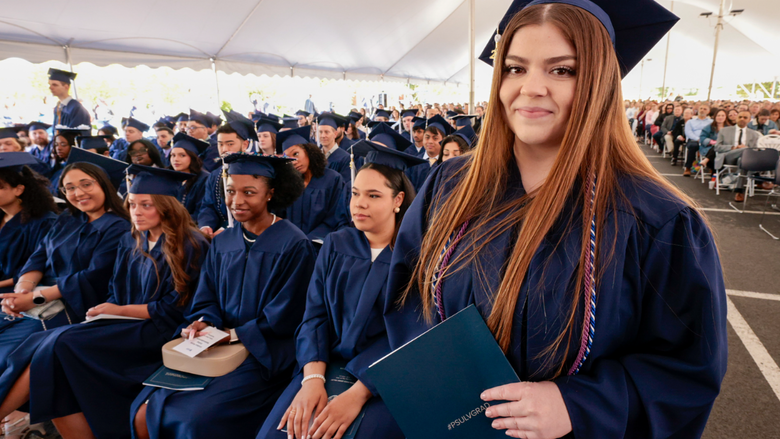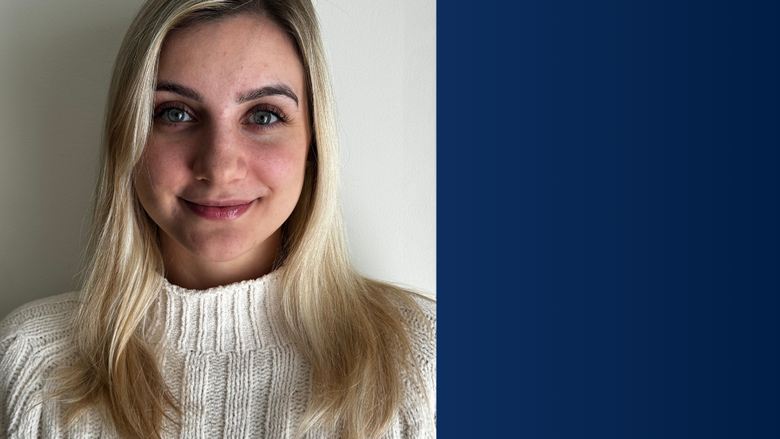

This dialog contains the full navigation menu for this site.

CENTER VALLEY, Pa. —The students, including five from Penn State, were part of the Connecting Humans and Nature through Conservation Experiences program
The Aegean Sea served as both a classroom and biology lab for a group of 20 students from all over the United States studying the environmental impact of microplastics this past summer. The students, including five from Penn State and 15 students enrolled in the College Year in Athens, traveled to Greece as part of the Connecting Humans and Nature through Conservation Experiences (CHANCE) program, an accredited interdisciplinary environmental education program whose overarching goal is to teach conservation biology and global sustainability at the front line. The students spent nearly one month learning, gathering data and testing water samples, tracking endangered sea turtles, dolphins and whales, and exploring ancient ruins.
The field work was conducted under the guidance of Jacqueline McLaughlin, professor of biology at Penn State Lehigh Valley (PSU-LV) and founding director of the CHANCE program, and Kathleen Fadigan, CHANCE instructor.
“We designed a highly unique curriculum for the students that combines research-based, best practices in STEM education, such as project-based learning and inquiry, which allowed for students’ to pursue topics that related to their personal and professional interests. Students experienced the scientific process firsthand, in ways that would be impossible in a traditional classroom setting,” Fadigan said.
The students worked in groups to devise feasible solutions to the problem of marine microplastic pollution.
“The world’s oceans are full of plastic pollution, but the truth is, the Mediterranean Sea is considered a hotspot due to its semi-enclosed nature, densely populated coastlines, heavy tourism activity, fishing, shipping, unsustainable consumption, and the ineffective waste management practices of many nations,” McLaughlin said. “Greece itself has many waste management issues including bulging, open-top landfills; a recycling rate lower than the European average; illegal landfills; lack of infrastructure and enforcement, and public awareness. Most plastic ends up in the sea. Unfortunately, it has become so prevalent that biodiversity in each and every marine food chain of this incredible aquatic ecosystem is suffering; but, by experiencing these realities students witness and come to understand the urgency to deal with these issues. That’s what makes this CHANCE program so special.”
Musab Siddiqi, a junior biology major, said he felt that the experience he’d gain through the CHANCE program would help prepare him for medical school. After taking two biology classes with McLaughlin and “loving” her teaching style, he decided to apply.
“She definitely cares about her students and pushes everyone to try their hardest. [Her classes] are challenging, but I’m glad, because I’m going into pre-med and will have challenging classes," he said. "With the CHANCE program, I was intrigued because I’ve always wanted to visit Greece; and the premise of it — studying the impact of microplastics pollution — well that’s something I wanted to work on and possibly make a positive impact on the world. CHANCE Greece was one of the best decisions I ever made.”
To better understand the full environmental impact of microplastics pollution, the students had discussions with management industry professionals and the group conducted site visits to get a broader picture of microplastic realities in Greece. The students visited water treatment facilities and waste facilities to show how these pollutants get into the water supply and, ultimately, how they escape into nature. Siddiqi said it opened his eyes to where these impurities go.
“It’s part of our everyday life, but we don’t really think about these things,” he said. “We witnessed how much work goes into treating the water supply; collecting, sorting, disposing, and recycling trash; and how these processes could be more efficient.”
The students also heard from several non-governmental organizations (NGO) representatives who shared their stories and discussed the environmental impact of their work.
Gabriel Roman, a second-year biology major from Quakertown, was intrigued by the idea of blending his love for biology with studying abroad in Greece, a country he’s always wanted to visit. He was not disappointed, he said.
“CHANCE Greece met and exceeded my expectations. The microplastics research we were doing was so interesting," he added. "It was cool to learn about conservation and meet people from organizations who are so passionate about it."
Working with the NGO, Archipelagos Institute of Marine Conservation, Roman said, was phenomenal.
“We lived on their research vessels for three days and visited select islands in the Aegean Sea, and they had so much technology on board. We were able to cast trawl nets to pick up samples of plankton then analyze each of these samples under microscopes for microplastic content. I didn’t expect to do that,” he said.
Doing real science to devise solutions to a prevailing scientific question is at the heart of the CHANCE program. Students participated in a beach cleanup in Glyfada, a suburb of Athens, then categorized, quantitated and deciphered the source of each trash item they collected while working under the direction of Domenico Vito, a research colleague of McLaughlin’s from San Diego State University and stationed in Italy. Vito runs Trash2Treasure, a global Citizen Science project, and personally came to Greece to work with the students.
“The students were so devastated by the amount of trash on this beach that they collectively came up with solutions to clean it up then decided to write a letter to the Greek authorities in this municipality to share their ideas,” McLaughlin said. “This course is about taking action.”
Sofia Sarracino, a junior at the University Park campus majoring in Earth science, drafted the letter to the municipal Councilor of Glyfalda. Sarracino said one of her biggest takeaways was the importance of community involvement around conservation and sustainability, i.e., individuals can accomplish a great deal by working together, with or without government support. She didn’t grasp the full extent of the plastic pollution issue in Greece until she participated in the CHANCE program, she said.
“I didn’t realize it’s such a problem in Greece because they are part of the United Nations, and I thought they were working on the domestic sustainability goals. There are not many waste management systems available that can handle all the waste Greece produces,” she said.
Soon, Sarracino, McLaughlin and Vito will be meeting virtually with several of the Greek authorities in the Glyfada municipality, as the city leaders positively responded to Sarracino’s letter and have agreed to take recommended steps to reduce trash in this area.
“We’re educating and empowering students to be problem-solvers,” McLaughlin said. “Through experiential learning in real-world settings with our outstanding partners, they unmask the anthropogenic pressures forced onto this essential environment. Over time, they [students] come to realize where they can, no matter what niche they fill in our global society, play a part in their lifetimes to reduce these pressures and help sustain our world’s biodiversity and ecosystems.”
Moreover, CHANCE creates experiences that are not easily forgotten, added McLaughlin.
“Reflection on experience is extremely powerful," she said. "CHANCE seeds the transformation of students into educated environmental advocates.”


